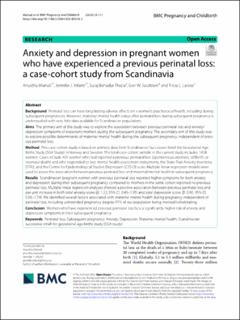| dc.contributor.author | Mainali, Anustha | |
| dc.contributor.author | Infanti, Jennifer Jean | |
| dc.contributor.author | Thapa, Suraj Bahadur | |
| dc.contributor.author | Jacobsen, Geir Wenberg | |
| dc.contributor.author | Larose, Tricia Lynn Lois | |
| dc.date.accessioned | 2023-02-16T14:04:28Z | |
| dc.date.available | 2023-02-16T14:04:28Z | |
| dc.date.created | 2023-02-14T10:24:45Z | |
| dc.date.issued | 2023 | |
| dc.identifier.issn | 1471-2393 | |
| dc.identifier.uri | https://hdl.handle.net/11250/3051595 | |
| dc.description.abstract | Background: Perinatal loss can have long-lasting adverse effects on a woman’s psychosocial health, including during subsequent pregnancies. However, maternal mental health status after perinatal loss during subsequent pregnancy is understudied with very little data available for Scandinavian populations. Aims: The primary aim of the study was to explore the association between previous perinatal loss and anxiety/ depression symptoms of expectant mothers during the subsequent pregnancy. The secondary aim of this study was to explore possible determinants of maternal mental health during the subsequent pregnancy, independent of previous perinatal loss. Method: This case-cohort study is based on primary data from Scandinavian Successive Small-for-Gestational Age Births Study (SGA Study) in Norway and Sweden. The total case-cohort sample in the current study includes 1458 women. Cases include 401 women who had reported a previous perinatal loss (spontaneous abortion, stillbirth, or neonatal death) and who responded to two mental health assessment instruments, the State-Trait Anxiety Inventory (STAI), and the Centre for Epidemiological Studies Depression (CES-D) scale. Multiple linear regression models were used to assess the association between previous perinatal loss and maternal mental health in subsequent pregnancy. Results: Scandinavian pregnant women with previous perinatal loss reported higher symptoms for both anxiety and depression during their subsequent pregnancy compared to mothers in the same cohort reported no previous perinatal loss. Multiple linear regression analyses showed a positive association between previous perinatal loss and per unit increase in both total anxiety score (β: 1.22, 95% CI: 0.49–1.95) and total depression score (β: 0.90, 95% CI: 0.06–1.74). We identified several factors associated with maternal mental health during pregnancy independent of perinatal loss, including unintended pregnancy despite 97% of our population being married/cohabitating. Conclusion: Women who have experienced previous perinatal loss face a significantly higher risk of anxiety and depression symptoms in their subsequent pregnancy. | en_US |
| dc.description.abstract | Anxiety and depression in pregnant women who have experienced a previous perinatal loss: a case‑cohort study from Scandinavia | en_US |
| dc.language.iso | eng | en_US |
| dc.publisher | BMC | en_US |
| dc.relation.uri | https://rdcu.be/c5zvM | |
| dc.rights | Navngivelse 4.0 Internasjonal | * |
| dc.rights.uri | http://creativecommons.org/licenses/by/4.0/deed.no | * |
| dc.title | Anxiety and depression in pregnant women who have experienced a previous perinatal loss: a case‑cohort study from Scandinavia | en_US |
| dc.title.alternative | Anxiety and depression in pregnant women who have experienced a previous perinatal loss: a case‑cohort study from Scandinavia | en_US |
| dc.type | Peer reviewed | en_US |
| dc.type | Journal article | en_US |
| dc.description.version | publishedVersion | en_US |
| dc.source.volume | 23 | en_US |
| dc.source.journal | BMC Pregnancy and Childbirth | en_US |
| dc.identifier.doi | 10.1186/s12884-022-05318-2 | |
| dc.identifier.cristin | 2125873 | |
| cristin.ispublished | true | |
| cristin.fulltext | original | |
| cristin.fulltext | original | |
| cristin.qualitycode | 1 | |

